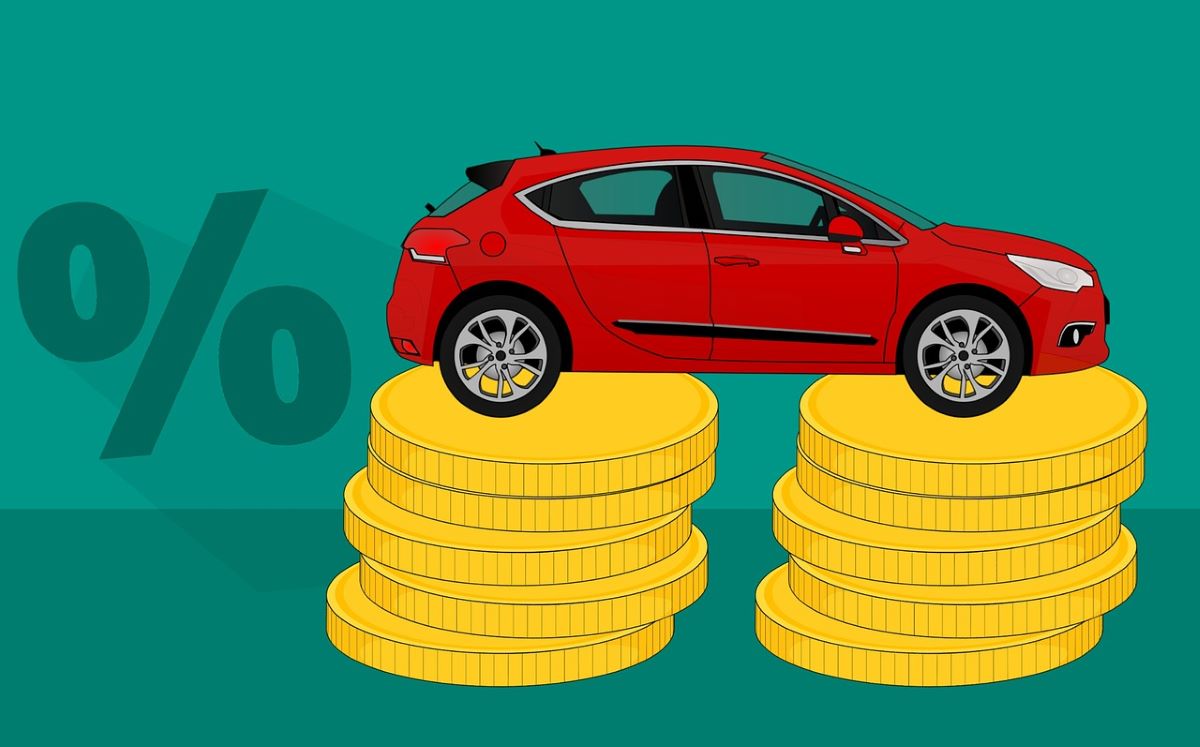Home>Finance>Whose Credit Score Is Used When Buying A Car With A Cosigner


Finance
Whose Credit Score Is Used When Buying A Car With A Cosigner
Published: October 21, 2023
When financing a car with a cosigner, the primary focus is on the cosigner's credit score. Find out how cosigner's credit score affects the car buying process.
(Many of the links in this article redirect to a specific reviewed product. Your purchase of these products through affiliate links helps to generate commission for LiveWell, at no extra cost. Learn more)
Table of Contents
- Introduction
- What is a cosigner?
- The role of a cosigner in car financing
- Understanding credit scores
- Whose credit score is typically used when buying a car with a cosigner?
- Factors to consider when choosing a cosigner
- How a cosigner affects the car loan process
- The impact of a cosigner on interest rates and loan terms
- The responsibilities of a cosigner
- Risks involved in cosigning a car loan
- Conclusion
Introduction
When it comes to buying a car, many people turn to financing options to spread out the cost over time. However, not everyone has a perfect credit history or meets the requirements of lenders. This is where a cosigner can come into play, opening up the possibility of securing a car loan.
A cosigner is someone who agrees to take joint responsibility for a loan with the primary borrower. By adding their name to the loan agreement, they provide an additional layer of security for the lender, increasing the chances of loan approval.
In this article, we will explore the role of a cosigner in car financing and specifically focus on the question of whose credit score is used when buying a car with a cosigner. We will also delve into the factors to consider when choosing a cosigner and highlight the responsibilities and risks associated with cosigning a car loan.
Understanding the dynamics of cosigning a car loan is crucial for both borrowers and individuals considering becoming a cosigner. So, let’s delve into the intricacies of this process and shed light on the important aspects that can impact car financing.
What is a cosigner?
A cosigner is an individual who agrees to take joint responsibility for a loan alongside the primary borrower. They essentially act as a guarantor, pledging to repay the debt if the primary borrower fails to do so. Typically, a cosigner has a stronger credit history and financial standing than the primary borrower, providing reassurance to the lender.
Cosigners are often sought after by individuals who have a limited credit history, low credit score, or inconsistent income. By having a cosigner, these individuals can increase their chances of loan approval and secure more favorable loan terms, such as lower interest rates and longer repayment periods.
It’s essential to note that cosigning a loan is a significant commitment. Cosigners are equally responsible for the loan, both legally and financially. They are subject to the same obligations and potential consequences as the primary borrower if the loan is not repaid as agreed.
One key aspect of cosigning is that the cosigner’s credit and financial information is also considered by lenders. This is because the cosigner’s role is to provide added assurance to lenders that the loan will be repaid. Hence, their creditworthiness becomes a vital factor in the loan approval process.
While a cosigner can be a family member, friend, or even a spouse, it’s crucial to establish open communication and trust before entering into a cosigning agreement. Both parties should have a clear understanding of the terms, responsibilities, and potential risks involved.
Now that we have defined what a cosigner is, let’s dive into the specific details of how a cosigner’s credit score comes into play when buying a car with a cosigner.
The role of a cosigner in car financing
When it comes to car financing, a cosigner plays a crucial role in helping borrowers obtain a loan. Here are some key responsibilities and benefits of having a cosigner:
- Loan approval: One of the primary roles of a cosigner is to increase the likelihood of loan approval. If the primary borrower has a less-than-ideal credit history or does not meet the lender’s requirements, a cosigner with a strong credit score can bolster the application.
- Better interest rates: Lenders often offer more favorable interest rates to borrowers with higher credit scores. By having a cosigner with an excellent credit history, the borrower may be able to secure a lower interest rate, resulting in significant savings over the life of the loan.
- Improved loan terms: In addition to lower interest rates, a cosigner can also help the borrower qualify for better loan terms. This may include a longer repayment period or lower monthly payments, making the loan more manageable for the borrower.
- Building credit: For individuals with limited or poor credit history, cosigning a car loan can be an opportunity to establish or improve their credit profile. By making timely payments, the borrower and cosigner can both contribute to building a positive credit history.
- Shared responsibility: As mentioned earlier, a cosigner shares equal responsibility for the loan. This means that they are legally obligated to repay the debt in case the borrower defaults. Sharing the responsibility can provide the lender with more confidence in approving the loan and help alleviate some of the risks associated with lending to borrowers with less-than-perfect credit.
It’s important to note that while a cosigner can significantly improve the chances of loan approval and secure better loan terms, they also take on potential risks. It’s crucial for both the borrower and the cosigner to understand their respective roles, obligations, and the potential consequences of defaulting on the loan.
Now that we have explored the role of a cosigner in car financing, let’s delve into the topic of credit scores and whose credit score is typically used when buying a car with a cosigner.
Understanding credit scores
Before delving into the question of whose credit score is used when buying a car with a cosigner, it is essential to understand what a credit score is and its significance in the loan approval process.
A credit score is a three-digit number that represents an individual’s creditworthiness. It is calculated based on various factors, including payment history, credit utilization, length of credit history, types of credit, and new credit applications. The most commonly used credit scoring models are FICO® scores and VantageScores.
Credit scores typically range from 300 to 850, with higher scores indicating a lower credit risk and greater likelihood of timely repayment. Lenders use credit scores to assess the level of risk associated with lending money to an individual. A higher credit score often translates to more favorable loan terms, including lower interest rates and higher loan amounts.
Each borrower and potential cosigner will have their own credit score, which reflects their credit history and borrowing behavior. Lenders may consider the credit score of both the primary borrower and the cosigner when evaluating the loan application.
It’s important to note that credit scores are not the sole determining factor in loan approval. Lenders also take into account other factors such as income, employment history, debt-to-income ratio, and the specific loan requirements.
In the next section, we will address the question of whose credit score is typically used when buying a car with a cosigner, as well as the factors to consider when choosing a cosigner for a car loan.
Whose credit score is typically used when buying a car with a cosigner?
When buying a car with a cosigner, the credit score of both the primary borrower and the cosigner can be taken into consideration by lenders. However, the specific approach may vary depending on the lender’s policies and the individual circumstances of the loan application.
In some cases, the lender may primarily focus on the credit score of the primary borrower. This is particularly true if the primary borrower has a relatively strong credit history and meets the majority of the lender’s requirements. The cosigner’s credit score may be used as a secondary factor to further strengthen the application and potentially secure better loan terms.
On the other hand, if the primary borrower has a limited credit history, a low credit score, or does not meet certain criteria, the lender may heavily rely on the cosigner’s credit score. In such situations, the cosigner’s strong credit profile becomes a crucial factor in determining the loan approval and the interest rates offered.
It’s important to note that lenders have their own evaluation systems and criteria for assessing loan applications, which can impact how they weigh credit scores. Some lenders may prioritize the credit score of the primary borrower, while others may consider both the primary borrower and the cosigner equally.
Furthermore, the significance of credit scores may also vary based on the type and size of the loan. For instance, if the loan amount is substantial or the borrower’s credit history is particularly weak, lenders may place greater emphasis on the cosigner’s credit score to mitigate risks.
Ultimately, the lender’s decision regarding whose credit score to prioritize when buying a car with a cosigner depends on the specific circumstances and the overall creditworthiness of the borrower and cosigner.
Now that we have addressed whose credit score is typically used, let’s explore the factors to consider when choosing a cosigner for a car loan.
Factors to consider when choosing a cosigner
Choosing the right cosigner for a car loan is a crucial decision that can greatly impact the loan approval process and the terms offered. Here are some important factors to consider when selecting a cosigner:
- Credit history and score: One of the primary factors to consider is the cosigner’s credit history and score. Ideally, you want a cosigner with a strong credit profile, as this not only increases the chances of loan approval but also helps secure better loan terms, such as lower interest rates.
- Financial stability: It’s essential to choose a cosigner who has a stable financial situation. Lenders will consider the cosigner’s income, employment history, and overall ability to repay the loan in case the borrower defaults. A cosigner with a steady income and solid financial background provides added reassurance to lenders.
- Relationship and trust: Cosigning a loan is a significant responsibility, so it’s important to choose someone with whom you have a strong relationship and trust. Whether it’s a family member or a close friend, open communication and a shared understanding of the loan terms and potential risks are crucial for a successful cosigning arrangement.
- Willingness to cosign: While someone may meet the credit and financial requirements, it’s important to consider their willingness to cosign the loan. Not everyone may be comfortable taking on such a responsibility, so it’s crucial to have an open conversation and ensure that the potential cosigner understands the obligations and potential consequences.
- Long-term commitment: Car loans often have a lengthy repayment period, so it’s important to choose a cosigner who is willing to commit for the long term. The cosigner’s credit history and financial situation should be stable enough to ensure that they can fulfill their obligation throughout the duration of the loan.
Considering these factors can help ensure that you choose a cosigner who not only meets the requirements of the lender but also has your best interests in mind. It’s important to approach the selection process thoughtfully and responsibly, as the choice of a cosigner can greatly impact your ability to secure a car loan and the terms offered.
Now that we have discussed the factors to consider when choosing a cosigner, let’s dive into how a cosigner affects the car loan process.
How a cosigner affects the car loan process
Having a cosigner can significantly impact the car loan process in various ways. Let’s explore how a cosigner’s involvement affects different aspects of obtaining a car loan:
- Increased chances of loan approval: One of the primary benefits of having a cosigner is the increased likelihood of loan approval. If the primary borrower’s credit history or financial situation does not meet the lender’s requirements, a cosigner with a strong credit profile can provide the necessary assurance for loan approval.
- Better loan terms: In addition to higher chances of approval, a cosigner can also help secure better loan terms. Lenders may offer lower interest rates, longer loan terms, or higher loan amounts when a cosigner is involved. This can result in lower monthly payments and potentially save the borrower a substantial amount of money over the life of the loan.
- Building credit: For borrowers with limited or poor credit history, having a cosigner can provide an opportunity to build or improve their credit. Making timely payments on the car loan can positively impact their credit score, creating a stronger foundation for future financial endeavors.
- Shared responsibility: When a cosigner is involved, both the primary borrower and the cosigner share the responsibility for the loan. This means that both parties are legally obligated to repay the debt. However, it’s essential for the primary borrower to understand that the cosigner’s credit may be negatively affected if there are missed payments or default on the loan.
- Increased borrowing power: A cosigner’s involvement can expand the primary borrower’s borrowing power. With a cosigner, the borrower may be eligible for a larger loan amount than they would qualify for on their own. This can be advantageous when purchasing a more expensive or higher-quality vehicle.
- Opportunity for loan refinancing: Once the primary borrower has established a positive payment history and improved their credit score, they may consider refinancing the car loan to remove the cosigner. Refinancing allows the borrower to secure a new loan with better terms and solely in their name.
It’s important to note that a cosigner’s involvement can have long-term implications for both the borrower and the cosigner. It’s crucial to have open communication, trust, and a clear understanding of the loan terms and responsibilities. Both parties should be aware of the potential risks and obligations associated with the cosigning arrangement.
Now that we have explored how a cosigner affects the car loan process, let’s examine the impact of a cosigner on interest rates and loan terms.
The impact of a cosigner on interest rates and loan terms
Having a cosigner can have a significant impact on the interest rates and loan terms offered by lenders. Here’s how a cosigner’s involvement can affect these aspects:
- Lower interest rates: One of the primary benefits of having a cosigner is the potential for lower interest rates. Lenders consider the cosigner’s strong credit history and financial stability, which can help offset any perceived risk associated with the primary borrower. This lower risk can lead to more favorable interest rates, resulting in reduced overall borrowing costs over the life of the loan.
- Better loan terms: In addition to lower interest rates, a cosigner can also help secure better loan terms. Lenders may be more willing to offer longer repayment periods or more flexible payment options when a cosigner is involved. Improved loan terms can make the loan more manageable for the borrower, with lower monthly payments and reduced financial strain.
- Increased borrowing capacity: With a cosigner, the primary borrower may be able to qualify for a larger loan amount. Lenders may be more inclined to approve a higher loan amount when a cosigner with a strong credit profile is involved. This increased borrowing capacity can give the borrower more options when selecting a vehicle or negotiating with dealerships.
- Access to specialized loan programs: Some lenders offer specialized loan programs or incentives for borrowers with cosigners. These programs may have specific benefits, such as lower down payment requirements or flexible credit criteria. The cosigner’s involvement can open doors to these specialized loan programs, providing additional advantages to the borrower.
- Opportunity for credit improvement: For borrowers with limited or poor credit history, having a cosigner can be an opportunity to improve their credit. Making timely payments on the car loan can contribute positively to their credit score, setting them on a path towards better financial prospects.
While a cosigner can positively impact interest rates and loan terms, it’s important to remember that there are risks involved for both the borrower and the cosigner. The cosigner is equally responsible for the loan and their credit can be negatively affected if there are missed payments or default on the loan.
Therefore, it’s crucial for the primary borrower to prioritize making on-time payments and meeting their financial obligations to protect their own credit and maintain a positive relationship with the cosigner.
In the next section, we will discuss the responsibilities of a cosigner when cosigning a car loan.
The responsibilities of a cosigner
When cosigning a car loan, a cosigner takes on several important responsibilities. Here are the key obligations and roles that a cosigner assumes:
- Repayment responsibility: The cosigner agrees to be equally responsible for repaying the loan if the primary borrower defaults or is unable to fulfill their obligation. This means that the cosigner is legally obligated to make timely payments to the lender, just like the primary borrower.
- Financial commitment: A cosigner should carefully consider their own financial situation before agreeing to cosign a loan. They should ensure that they have the financial means to cover the loan payments if the primary borrower is unable to do so. Failing to meet the financial commitment can have serious consequences, including damage to the cosigner’s credit score and potential legal action from the lender.
- Communication with the borrower: It’s important for the cosigner to maintain open communication with the borrower throughout the loan term. This includes staying informed about the loan status, payment due dates, and any changes in circumstances that may affect the ability to make payments. Regular communication can help both parties stay on top of the loan obligations.
- Monitoring loan activity: The cosigner should also monitor the loan activity closely. This involves keeping track of the loan balance, payment history, and any potential issues or discrepancies. It’s crucial to address any concerns or discrepancies promptly to protect the cosigner’s financial interests.
- Credit implications: The cosigner’s credit history can be impacted by the loan. Late payments or default by the primary borrower can negatively affect the cosigner’s credit score. Conversely, making timely payments can help improve the cosigner’s credit standing. Therefore, the cosigner should be diligent about ensuring that payments are made on time to protect their own credit health.
- Long-term commitment: The cosigner’s commitment extends for the duration of the loan term or until the loan is refinanced or paid off. It’s crucial to understand that cosigning is a long-term commitment, and the cosigner should be prepared to fulfill their obligations until the loan is fully repaid.
Understanding and fulfilling these responsibilities is essential for maintaining a positive cosigning arrangement. Both the borrower and the cosigner should have a clear understanding of their roles and obligations before entering into the loan agreement.
In the final section, we will discuss the risks involved in cosigning a car loan and highlight important considerations for both the borrower and the cosigner.
Risks involved in cosigning a car loan
While cosigning a car loan can be beneficial for both the borrower and the cosigner, it is important to be aware of the potential risks involved. Here are some key risks to consider:
- Credit implications: If the primary borrower fails to make timely payments or defaults on the loan, it can negatively impact both the borrower’s and the cosigner’s credit scores. This can make it challenging for the cosigner to obtain credit in the future or result in higher interest rates on future loans.
- Financial responsibility: As a cosigner, you are equally responsible for repaying the loan. If the primary borrower is unable to make payments, the responsibility falls on you to ensure the loan is repaid. This can put a strain on your finances and potentially lead to legal consequences if payments are not made.
- Relationship strain: Cosigning a loan can put a strain on the relationship between the borrower and the cosigner. Financial conflicts or difficulties in repaying the loan can lead to tension, disagreements, or even the breakdown of the relationship in extreme cases. It is crucial to communicate openly and set clear expectations upfront to minimize the risk of straining the relationship.
- Limited financial flexibility: When you cosign a loan, your creditworthiness and financial flexibility may be impacted. This includes taking on additional debt obligations, which can affect your ability to obtain credit for your own needs or goals, such as purchasing a home or starting a business.
- Unable to remove your name from the loan: Once you have cosigned a car loan, it can be challenging to remove your name from the loan agreement. Even if the primary borrower’s financial situation improves or they wish to refinance the loan, you may still be legally bound to the original loan terms.
- Default risk: If the primary borrower defaults on the loan and is unable to repay the outstanding balance, the lender may pursue legal action against both the borrower and the cosigner. This can result in wage garnishment, asset seizure, or the need to declare bankruptcy.
Considering these risks is crucial when deciding whether to cosign a loan. It is important for both the borrower and the cosigner to assess their financial situations carefully and have a clear understanding of the potential consequences before entering into a cosigning arrangement.
Before concluding, let’s review the key points discussed in this article and reiterate the importance of responsible decision-making when cosigning a car loan.
Conclusion
Cosigning a car loan can be a valuable tool for borrowers who may not have a strong credit history or meet the lender’s requirements on their own. A cosigner’s involvement can increase the chances of loan approval and lead to more favorable loan terms, such as lower interest rates and improved borrowing capacity.
However, it’s crucial to approach cosigning with careful consideration and understanding of the responsibilities and risks involved. Both the borrower and the cosigner should have open communication, trust, and a clear understanding of the loan terms and obligations.
The decision of whose credit score is used when buying a car with a cosigner can vary depending on the lender’s policies and the specific circumstances of the loan application. Lenders may primarily consider the primary borrower’s credit score, while also taking the cosigner’s credit profile into account.
When choosing a cosigner, factors such as the cosigner’s credit history, financial stability, relationship, willingness, and long-term commitment should be carefully considered. Selecting a cosigner who meets these criteria can increase the chances of loan approval and help secure better loan terms.
Although cosigning a car loan has its benefits, there are also risks involved. These risks include potential credit implications, financial responsibility, strain on relationships, limited financial flexibility, and the challenge of removing your name from the loan. It’s essential to weigh these risks and make an informed decision before committing to cosign a loan.
In conclusion, cosigning a car loan can provide a valuable opportunity for borrowers to obtain financing and achieve their transportation needs. However, it should be approached with caution, clear communication, and a thorough understanding of the responsibilities and potential risks. By carefully considering all aspects, borrowers and cosigners can navigate the car loan process successfully and make informed decisions for their financial well-being.














